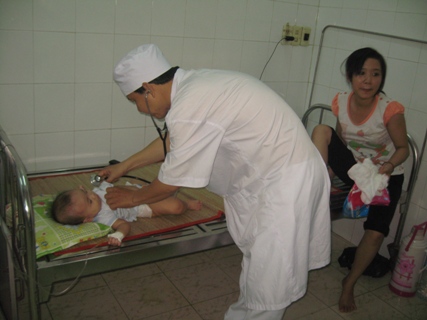
The project sets out the goal of providing medical
examination and treatment in communes and wards’ medical stations to ensure that
at least 90% of communes’ health stations will be eligible for providing medical
examination and treatment for health insurance patients by 2020
The project sets out the goal of providing medical
examination and treatment in communes and wards’ medical stations to ensure that
at least 90% of communes’ health stations will be eligible for providing medical
examination and treatment for health insurance patients by 2020 and that at
least 80% of the list of technical services at the medical units at commune
level will be provided. Also, it is necessary to strive for 100% of communes’
medical stations to be eligible for providing medical examination and treatment
for health-insurance patients and for at least 90% of the list of technical
services at commune-level medical units to be provided; and to reduce the
overcrowding at higher-level hospitals.
One the one hand, this project focuses on such
solutions as piloting the establishment of satellite clinics of some hospitals
at the district, provincial and national levels located at communes and wards’
medical stations and residential areas; providing training and transferring
urgent technologies as an addition to the list of technical services and the
scope of professional activities for the practitioners at communes and wards’
medical stations; prioritizing the management of non-communicable diseases. On
the other hand, the project builds up a network of communes and wards’ medical
stations to receive transfer technology from the doctors of higher-level
hospitals, who provide medical examination and treatment, training and
technology transfer to improve local healthcare; and so on.
To implement the project effectively, the Ministry
of Health assigns 15 national-level hospitals to join hands in and to be
responsible for sending their training officials, transferring technology,
providing medical examination and treatment at communes and wards’ medical
stations, and developing a list of technical services and packages of 22
specialties with the doctors who regular provide medical examination and
treatment at communes and wards’ medical facilities including surgery,
rehabilitation, traditional medicine, eyes, ears - nose - throat, teeth - jaw -
face, dermatology, obstetrics, endocrinology, pediatrics, tuberculosis, mental
illness, and so on.
For higher-level hospitals, the district’s medical
center is responsible for sending their professional staff who provides
training, transfers technologies, and provides medical examination and treatment
at communes and wards’ medical stations. A higher-level hospital may send its
staff to and give assistance to a lot of communes and wards’ medical stations.
On the contrary, the medical station of a commune or a ward can receive the
staff from many higher-level hospitals, who take charge of technology transfer.

The Departments of Health of provinces and cities
need to make a list of the health centers with the communal and ward medical
stations that would like to receive the staff that takes care of technology
transfer from higher-level hospitals
In addition, the Departments of Health of provinces
and cities are supposed to make a list of the health centers with the communal
and ward medical stations that would like to receive the staff that takes care
of technology transfer from higher-level hospitals; appraise and approve the
additional lists of medical examination and treatment technologies at communal
and ward medical stations as the officials from higher-level hospitals come to
provide medical examination and treatment; and arrange the human resources at
communal and ward medical stations to ensure the reception of professional
skills and training from higher-level hospital doctors.
In the process of carrying out the projects related
to health insurance, the Ministry of Health asked the health departments of 63
provinces and cities to assign their tasks to a number of communes and wards’
medical stations that are eligible for providing health-insurance medical
examination and treatment services; and appraise and approve of the additional
lists of medical examination and treatment technologies at communes and wards’
medical stations as the staff from higher-level hospitals come to localities to
provide medical examination and treatment.
The Departments of Health of provinces and cities
are responsible for cooperating with health insurance agencies to register for
initial medical examination and treatment at 5,000 to 10,000 at each commune and
ward’s medical station; investing in facilities and equipment used for medical
examination and treatment; directing the full supply of medicine according to
the Health Ministry’s regulations on the list of medicine that are paid by the
Health Insurance Fund at communal level; and ensuring a smooth settlement of
health insurance payments.
Duy Minh (Dieu Linh)